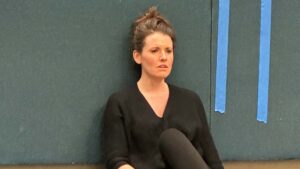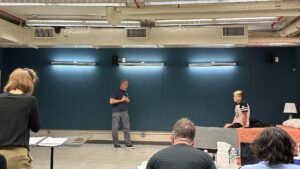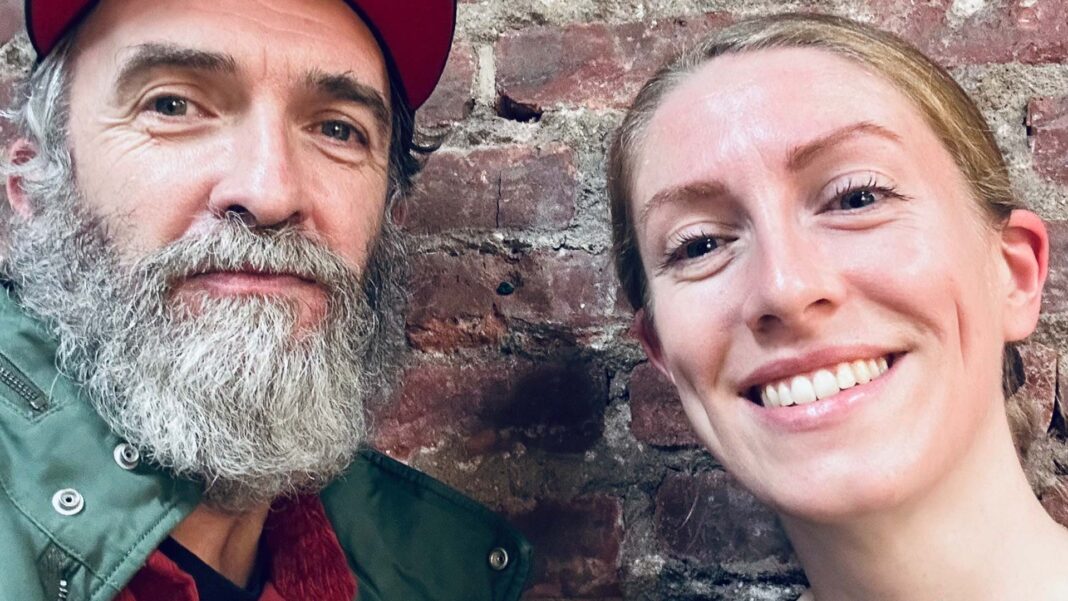Yesterday the 10th anniversary Prototype Festival opened in New York. It’s a festival that celebrates new opera works. On Saturday two one-act operas by composer Emma O’Halloran and librettist Mark O’Halloran will have their world premiere: Trade and Mary Motorhead.
Mark is best known as a screenwriter and playwright. His plays serve as the source material for these two operas. Mary Motorhead, which was first performed in 2001, depicts a woman (Naomi Louisa O’Connell) in prison who stabbed her husband in the head. While there she ponders what led her to this grisly act of violence.
Trade, first performed in 2011, tells the story of a married man (Marc Kudisch) and his relationship with a young hustler (Kyle Bielfield). It is revealed that both men feel trapped in their very different lives.
Emma, who has written works for large and small ensembles, never thought she would write an opera. But as I learned in my interview with her and uncle Mark, life is full of surprises and revelations. What follows are excerpts from our conversation that have been edited for length and clarity. To see the full interview, please go to our YouTube channel.
Does the adage write what you know fit either of you? If so, how is that reflected in these two very interesting pieces?
Mark: As a literary person, I don’t believe in writing just what you know. I believe in writing from what you know so that your own perspective is brought into anything. You can also write about anything you want. So the two works, from my point of view, originated because they were works of imagination really. They weren’t something that I’d been through.
When these were conceived as operas did both of you conceive them as works that would coexist together?
Emma: I don’t think so. I hadn’t ever really imagined that I would write an opera. I had entered this competition that Beth Morrison Projects was running around 2018. I had progressed through and I got a small commission to write a 30-minute minor drama or chamber opera. It was more a case of, Oh God, I need to find a subject matter that I can work with. And I remember seeing Mary Motorhead as a play. This will be what an amazing character study.
My impression of opera up until that point was that the women are like hysterical two-dimensional characters who are inevitably murdered. And Mark’s character, Mary Motorhead, is just the total opposite. She’s all of these messy and complicated things. And it felt really exciting to dive in there. I think Mark’s language is just musical. There is an economy there where something can be conveyed through a look or a gesture. So there’s loads of room for music to come around. I just loved working with Mark, so it was let’s try another one together.

Mark, do you find writing a libretto as having different requirements and a learning curve for you that is different than writing a play or screenplay?
Mark: I think certainly it’s different from a play. I think the first question I asked Emma was does it have to rhyme? I was very happy to find out that it didn’t. But I find that music is unique in that it can do two, three different things at the same time. Whereas language really is only doing one thing for you. So you were able to just peel back and peel back and peel back. A lot of the plays or the screenplays that I write, as people would say, are kind of full of silences. But actually there were a lot more words than we needed. I haven’t seen it live yet, but I’ve heard it sung and it’s just beautiful listening to that. It has been an interesting learning curve to see how language fits in with music.
How much does music play a role from your perspective in making these stories more approachable from the audience’s point-of-view? We’re not dealing with necessarily the nicest characters.
Emma: I definitely don’t think either myself or Mark want to tell somebody how to feel. But what’s exciting for me is this is really character-driven and you really get to know and like the characters. So even if they do unlikable things, we’re all complicated, messy human beings. I think that people are kind of mirrors for each other. Especially in Trade when there’s two people sort of interrogating each other. They’re triggered by things that they see in the other character that they might not like within themselves.
In terms of the music, to try and find a way into it, I’ll try and build worlds these characters can exist in. So before I even write a melody line I’m going to be creating like a Pinterest moodboard of sounds. So I want it to feel as real as possible for them to feel like fully-fledged people; they’re human. Maybe that’s the way for people to get to know someone that they may never encountered themselves in their lives.
Mark, there’s a line in the libretto for Mary Motorhead that really resonated with me and stood out as maybe this is where the story pivots. She says “And slowly we stopped laughing so much.” As soon as I read that line I thought that’s the moment where it turns for me as an audience. Is that an accurate perception and does that line carry as much significance as it seems to on on the printed page?
Mark: Funny enough, that monologue, as it was in the theater, formed part of a series of monologues. There was a monologue from her husband’s perspective – he who gets the knife in the head. There was some of their friends. There was also a monologue for her. I think what I was interested in doing was writing a series of disappointed lives. I mean they’re kind of extreme versions of it. But people who, when they were kids, are all full of like, oh fuck that. Then they realize that this fronting up or this kind of put-on thing ultimately undoes them. They get to a certain point where they can’t get away from it anymore and they’ve wrecked everything. I think that moment is probably what it is, but what it pivots around is we stop laughing and after we stop laughing what is there left. There’s nothing really for them to save themselves in a way.
Reading the libretto for Trade, and I want both of you to comment on this, there are these very short lines through most of it and then suddenly they spill their guts out. Mark, what did you want to show about who these characters are when they finally opened up? And Emma, how does that allow you an opportunity with the music to more fully open up?
Mark: They get to a certain point where their language runs out. They don’t have the language to describe themselves anymore or the predicament anymore. Then when they do find it, it comes out in a flood. Usually when you write in that kind of a way, writing the dialogue becomes revelation within the moment. I’m not even sure why I’m telling you this, but bang, there you go. It has a dramatic impact, I think. So that lent a lot of ease to the idea of writing an aria or something like that. You can take those moments and really deepen them, I think.

Emma: Mark’s kind of written the pacing into the opera, which makes my life so much easier – when you have someone that’s only responding with a yeah or a voice and then there’s a lot of silence in between. I extended those silences to really have this incredible tension so that the release of someone actually singing about I dreamt about you last night or whatever is really powerful.
The two actors/singers in rehearsal, putting it together section by section, may have had some questions about this silence feeling like a really long time. But then when it actually was all put together and we did a run, those silences were so necessary. The tension at the very start makes the ending so much more powerful. I don’t think I would be able to do anything like that without Mark’s words.
What do you think that these two pieces have in common?
Mark: They’re not traditional fodder for making of opera stories. But they are love stories, actually, at the heart of each of them. Really broke and screwed-up love stories. So maybe that’s good. There’s a bit of attempted murder. At one point in one of them there’s a bit of violence. I think they work as operas. They both are stories of of shattered people. And I think that’s really interesting to find music to lift them up.
Emma: One person is in a prison, but they’re all sort of imprisoned in their own worlds. I realized with both Mary Motorhead and with Trade, because the sets are small confined spaces, it’s exciting for me because I can get the music to be the thing that creates the expansive world. I think that connects them.
With these two operas your lives both carried off into directions you weren’t anticipating. What have you learned about yourselves in the creation of these two pieces and how do you think that will influence what you do moving forward?
Mark: I have learned absolutely nothing about myself. Only that sometimes stories are malleable. They can move from one form to the next, but you have to put work in to get them there. The idea I’m suddenly the author of a libretto of an opera seems very posh to me and and I’m very delighted. Trade was produced by the Dublin International Theater Festival here in Dublin. It was done as a site-specific work. We took over the bedroom of a small B&B hotel and put a small little riser in there so that we could fit 30 people in there. It’s just a small room. I like the idea that this small room has now gone to New York. In some way that it’s traveled.
Emma: I definitely never imagined writing an opera. But funnily enough, I think it’s the one thing that I feel like I can do really well. Where with all other music I’m generally like, “Oh Jesus, this is horrible. Like, who would ever listen to this thing? I don’t know what I’m doing.” When it comes to actually words and then music coming together, I just feel like I have an instinct for it and it’s really exciting.
I only realized that when I got into the room for Mary Motorhead and saw Naomi acting and the music interacting with her and then lights. All of these elements coming together to tell a story. How powerful is that and how powerful is it that you can tell a story? That’s where the music is, the driving force. It definitely sort of awoke something inside of me. I want to keep doing more of this. So I don’t know whether it will mean I just only do to opera, but I will think more theatrically about other things, too.
Mary Motorhead and Trade will also be presented by LA Opera Off-Grand at REDCAT from April 27th – April 30. For tickets and more information, please go here.
To watch the full interview with Emma O’Halloran and Mark O’Halloran, please go here.
Photo: Librettist Mark O’Halloran and composer Emma O’Halloran (Courtesy Prototype Festival)











